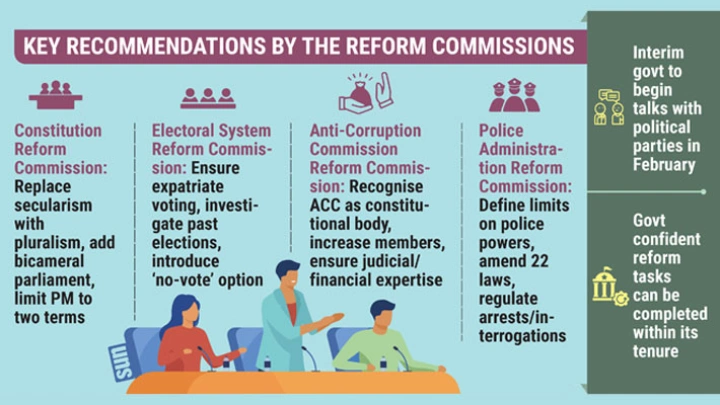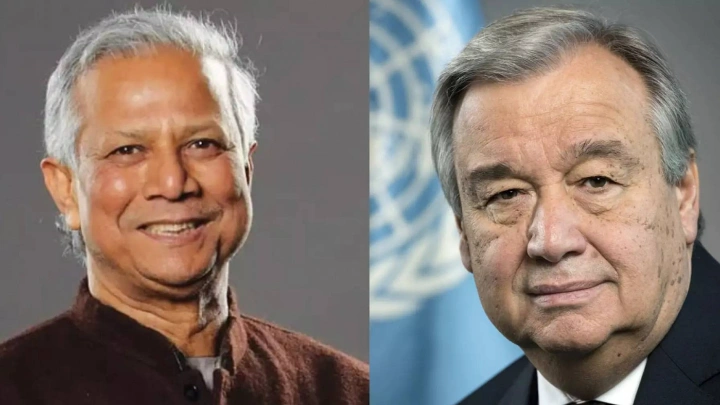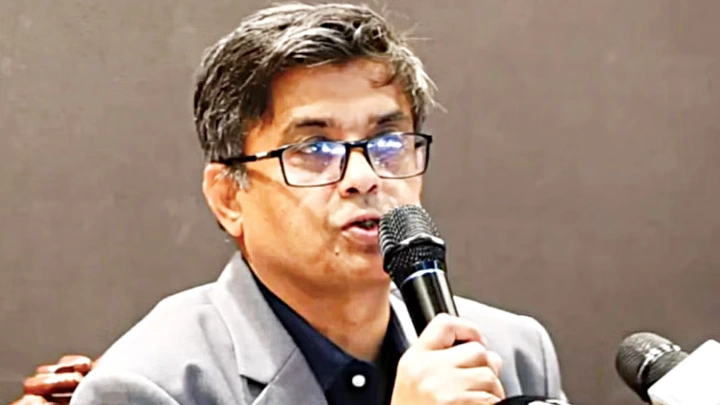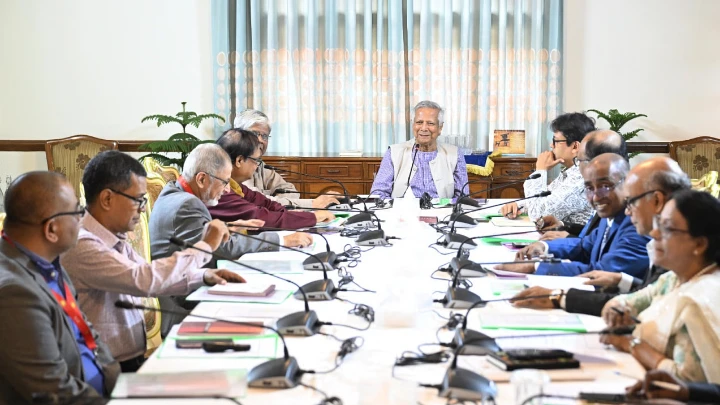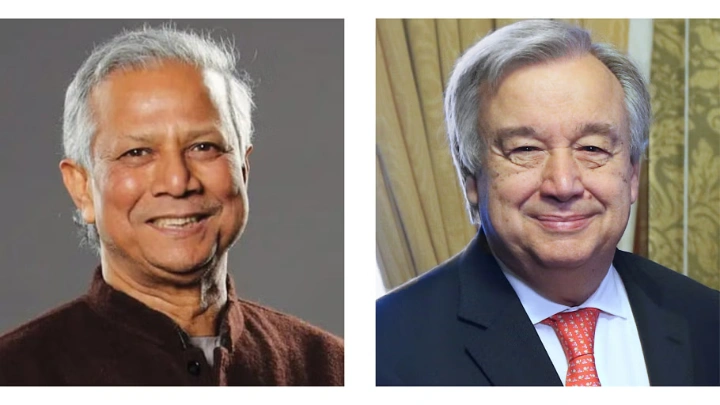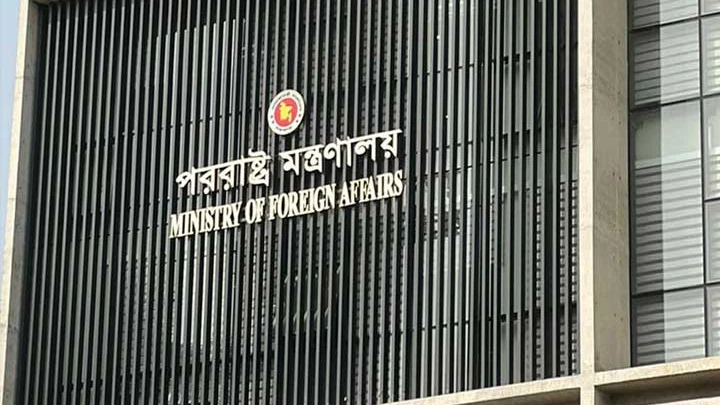Four reform commissions recommend sweeping changes for nation’s future
DailySun || Shining BD
In a major step towards shaping the future of the nation, four of the six government-formed reform commissions presented their recommendations for sweeping changes to Chief Adviser Prof Muhammad Yunus on Wednesday.
The proposed reforms cover key areas, including the electoral system, police administration, anti-corruption measures, and constitutional changes, all aimed at building a more transparent, democratic, and accountable government.
These reports offer a blueprint for a “new Bangladesh,” with Prof Yunus highlighting the important role they play in creating a national charter born from the July mass uprising.
“The vision of a new Bangladesh we aim to build rests on your shoulders (members of the commissions). You have crafted the foundation for these aspirations, marking the beginning of a new chapter,” he said.
The chief adviser further said that the interim government would discuss the reports with all stakeholders to ensure alignment with the nation's collective goals.
“We will evaluate whether we are on track to fulfill the promises we have made,” he maintained.
Prof Yunus further explained that the reform commissions would lead these discussions, having already provided the interim government with a solid foundation.
“We aim to create a charter born from the mass uprising, a green charter for a new Bangladesh. This will be developed through consensus,” he said.
He reiterated that the vision for a new Bangladesh rested on the members of the reform commissions, highlighting their role in shaping this new chapter.
Prof Yunus stated that the framework outlined in the reports would pave the way for the creation of the new Bangladesh charter, based on broad consensus.
“The upcoming elections will also be held in accordance with this charter. We hope all parties will sign it. This charter represents a commitment to the nation, not to any individual party,” he stressed.
“We will endeavour to implement this charter swiftly. It must remain steadfast and be implemented without deviation. We want to ensure its continuity and fulfilment,” he added.
The Chief Adviser affirmed that the elections must be inclusive, or else the charter would lose its significance.
“We will progress towards a new government based on discussions with political parties, guided by the charter. This government will uphold the charter and lead the nation forward,” Prof Yunus concluded.
Earlier, members of the four reform commissions arrived at the Chief Adviser’s office in Tejgaon at around 11:30am to submit their reports. The advisers of the interim government were also present.
The Electoral System Reform Commission, headed by Dr Badiul Alam Majumdar; the Police Administration Reform Commission, led by Sarfaraz Hossain; the Anti-Corruption Reform Commission, headed by TIB’s Dr Iftekharuzzaman; and the Constitution Reform Commission, headed by Distinguished Prof Ali Riaz of Illinois State University, all handed over their reports.
In a separate briefing later that afternoon at the Foreign Service Academy, Law Adviser Asif Nazrul stated that laws would be formulated and implemented based on consensus following discussions with political parties.
“It will take time, but we expect to complete the necessary reforms by June next year,” he said.
Asif Nazrul added, “Discussions with political parties will begin in mid-February regarding the reports submitted by the commissions. Implementation of the recommendations will be guided by the political parties’ willingness.”
The law adviser also confirmed that the ‘trial court’ would commence the July genocide trial before the next election.
He added that a National Consensus Commission has been formed, headed by Prof Yunus. Chiefs of the previously-formed six reform commissions are its members. The commission will work to build political consensus for state reform.
Environment Adviser Syeda Rizwana Hasan stated that the reform commission heads had requested one month to finalise the priorities, with formal talks for consensus to begin in mid-February.
Shafiqul Alam, the chief adviser’s press secretary, mentioned that the executive summaries of the reports would be shared, along with the key features of the recommendations.
The interim government, which came to power through the July mass uprising, has emphasised the need for reforms in various sectors from the outset.
As part of this effort, 11 reform commissions were formed in two phases. Among them, the Electoral System Reform Commission, Police Administration Reform Commission, Judiciary Reform Commission, Anti-Corruption Reform Commission, Public Administration Reform Commission, and the Constitution Reform Commission were set up in the first week of October last year.
The deadline for submitting reports for the Judiciary Reform Commission and the Public Administration Reform Commission has been extended.
Constitution Reform Commission
Prof Ali Riaz, head of the Constitution Reform Commission, stated that they had proposed five fundamental principles: equality, human dignity, social justice, pluralism, and democracy.
In the current Constitution, the fundamental principles are ‘nationalism, socialism, democracy, and secularism’. The proposed reforms suggest removing nationalism, socialism, and secularism.
The commission also recommended changing the constitutional name of Bangladesh from the ‘People’s Republic of Bangladesh’ to the ‘Democratic Republic of Bangladesh’.
Additionally, the commission proposed the introduction of a bicameral parliament, comprising a lower house (National Assembly) based on majority representation and an upper house (Senate) based on proportional representation.
A new constitutional body, the National Constitutional Council, was also recommended to ensure checks and balances between the three branches of government and the two executive positions—the prime minister and the president.
The commission further proposed reforms to allow the prime minister to face a no-confidence motion in Parliament, as well as amending Article 70 to prevent the Prime Minister from being fully protected by it.
A two-term limit for the prime minister’s tenure was also recommended, alongside revising the current method of electing the president.
The proposal suggested electing the president through an electoral college, with a four-year term.
Electoral System Reform Commission
This commission proposed measures to ensure voting rights for expatriates and recommended the creation of an Election Commission Appointment Act.
The commission presented 150 recommendations across 18 key areas, including the investigation of those responsible for the last three elections, especially the 2018 national elections.
It also recommended repealing the provision for the use of electronic voting machines (EVMs) and including the Department of Defense in the definition of law enforcement agencies during elections.
Furthermore, the commission suggested holding re-elections if less than 40% of voters cast their ballots in any constituency, as well as introducing a ‘no-vote’ option in national elections.
Provisions for social media campaigns in line with the Cyber Security Ordinance, 2024, were also proposed, along with a code of conduct for political parties similar to the 1990 alliances.
ACC Reform Commission
The ACC Reform Commission proposed 47 recommendations, including recognising the Anti-Corruption Commission as a constitutional body, rather than a statutory one.
It also recommended increasing the number of commission members from three to five, with mandatory female participation and the inclusion of individuals with judicial and financial expertise.
Police Administration Reform Commission
The Police Reform Commission recommended establishing clear limits on the force’s power regarding illegal gatherings and processions, as well as guidelines for arrests without warrants and questioning suspects in custody.
The commission also called for amendments to 22 laws to reform the police force, as well as recommendations regarding arrests without warrants and police interrogation during remand.
Shining BD

